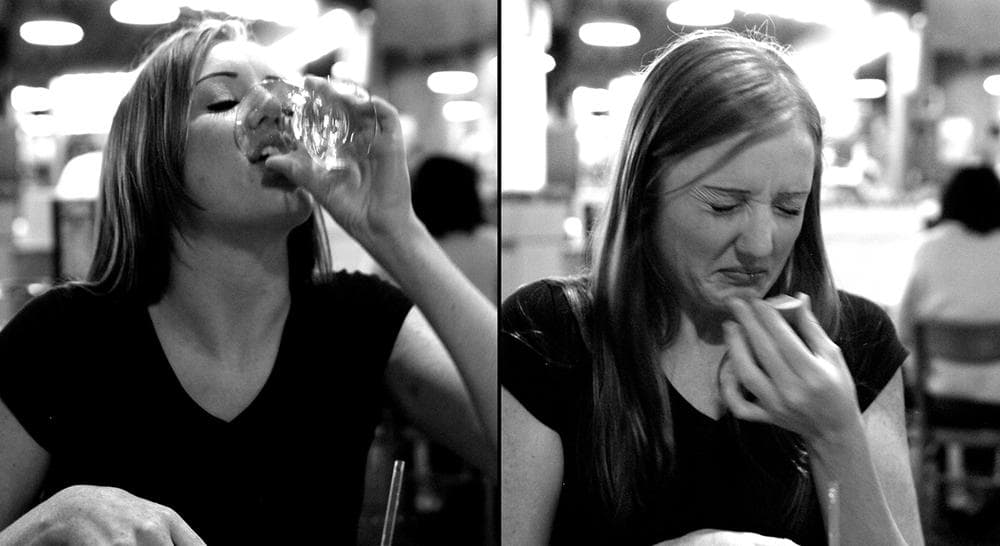Advertisement
Why Feminists Don't Get Drunk

It’s been a month since Slate’s Emily Yoffe sparked an Internet firestorm with her essay “College Women: Stop Getting Drunk,” which urged female students to protect themselves from sexual assault by not getting wasted at parties. That’s an eon in cyber-time, but the furor has yet to die down — a testament to the strength of the passions Yoffe tapped into.
In the eyes of her critics (and they are legion) Yoffe’s warnings are dangerously regressive, placing the focus on female behavior when it should be on rapists and perhaps even offering rapists license to operate. “Warning women about heavy drinking places the burden of not being sexually assaulted squarely on the shoulders of the victims,” is how one writer put it.
I see it differently — perhaps because, 30 years ago, I was one of these young women.
My college years were awash in alcohol — as were my 20s and early 30s (not surprising, in light of the fact that drinking patterns are often established in these early years). Given how much I drank, far fewer bad things happened to me than might have been expected. I was never the victim of a major crime. I didn’t die in a drunken car crash or snowmobile accident or fall out of a window. I didn’t experience liver failure, or die of alcohol poisoning. (As for the increased risks of breast and other cancers associated with heavy drinking, I guess the verdict is still out.) Warnings would have served me well. I never got them.
There is a world of difference between saying: 'Don’t get drunk because men will look at you and see a vulnerable woman,' ... and 'Don’t drink because it strips you of agency and the power to think and act on your own behalf.'
To some, Yoffe’s warnings smack of the same sort of paternalism that tells women not to wear short skirts lest they attract a rapist. But think about it. Short skirts do not make you do stupid things that you wouldn’t do in a million years if you weren’t wearing them. Short skirts do not have a measurable negative impact on adolescent brain development. They don’t increase your risk of cancer or fatal hemorrhagic stroke. (This last risk applies to heavy drinkers of both genders, but the odds are five times higher for women). You can wear short skirts until the cows come home, and they are never ever going to kill you.
This isn’t to say that I’m on board with everything Yoffe says. Indeed, I was struck by one significant way that the women-in-short skirts analogy does hold up — and that is in Yoffe’s deference to male perceptions. There is a world of difference between saying: “Don’t get drunk because men will look at you and see a vulnerable woman,” as Yoffe repeatedly suggests, and “Don’t drink because it strips you of agency — the power to think and act on your own behalf.” The former positions us as objects, to adopt the language of proto-feminist Simone de Beauvoir; the latter positions us as subjects. The latter is, at heart, a feminist stance. And it is where I stand.
Not everyone will stand with me. There is a strand of feminist discourse that celebrates hard partying as a hallmark of liberation. A New York magazine piece describes a salon-style party a few years back where two Jezebel.com editors “got so visibly s*#!faced and the conversation so disturbing that some critics referred to it as ‘The Night Feminism Died.’ (When asked why she didn’t prosecute her date-rapist, one of the young women, woozily clutching her can of beer, answered, ‘Because it was a load of trouble and I had better things to do, like drinking more.’)” And here we will have to agree to disagree. Simply put, I am hard pressed to cheer on women who opt to deploy their personal agency by abnegating it.
In the end, what most troubles me about the debate over Yoffe’s piece are efforts to forcibly cordon off the topic of women’s drinking, placing it off limits for discussion. “This is not about people in the grip of addiction, this is about women being targeted for sexual violence,” wrote one Facebook friend who works in violence prevention and took me to task for “derailing the conversation” by continuing to talk about alcohol.
In fact, it’s about both. Women — human beings — are intensely multi-disciplinary projects, with many things going on in us at once and all the time. Race, class, family history, genetics, and social context — these are just a few of the complex variables woven throughout our lives. This is one of the major challenges of social epidemiology, the field that studies the pathways by which social conditions affect human health. It is hugely complicated, if not impossible, to isolate causes.
Sexual violence is a women’s issue, and so is alcohol, and in their Venn diagram overlap sit the critical topics of women’s health and personal agency.
It also bears noting that, while binge drinking is increasingly an equal opportunity sport on college campuses, the risks of heavy drinking are especially great for women — not only because drinking increases vulnerability but also because of female physiology. Women’s higher rates of body fat means there is less water to dilute alcohol, and a lower level of a key metabolizing enzyme compounds the problem. A huge proportion of what we drink quickly enters our bloodstreams. “I was really worried about date rape at the party,” said Angie Ammons, whose 19-year-old daughter died of alcohol poisoning after a spring break party during her freshman year of college, making her one of an estimated 1,825 students between the ages of 18 and 24 who die each year from unintentional alcohol-related injuries. “Never did I think she would drink so much in a short time that it would cost her her life.”
“Alcohol is not a women’s issue.” This jaw-dropping claim came from none other than feminist icon Gloria Steinem at the 40th birthday party for Ms. magazine, speaking to writer Ann Dowsett Johnston, who quotes the exchange in her new book “Drink: The Intimate Relationship Between Women and Alcohol.” The fact that Steinem could say something so wildly off base — even as research and news reports (like this and this and this) continue to document the fast-growing trend of problem drinking among women — points to the enormous challenges that we face in building constructive alliances across disciplines and interests.
Sexual violence is a women’s issue, and so is alcohol, and in their Venn diagram overlap sit the critical topics of women’s health and personal agency. This isn’t an either/or. We need to talk about both. And we need to find ways to talk about them in the same (feminist) conversation.
